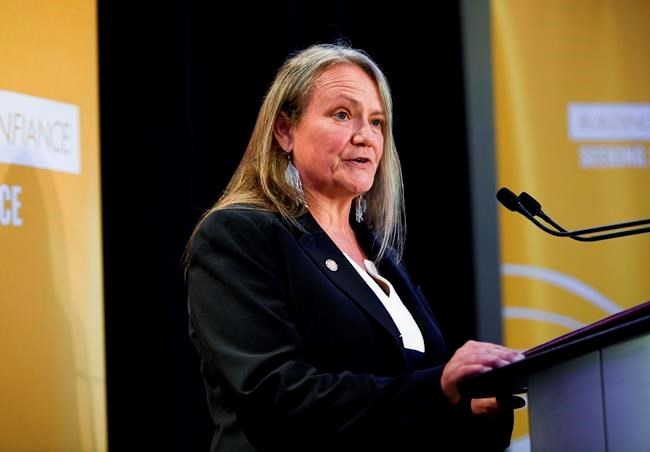OTTAWA — Canada should give "urgent consideration" to legal mechanisms as a way to combat residential school denialism, said a Friday report from the independent special interlocutor on unmarked graves.
Justice Minister David Lametti said he is open to such a solution.
Kimberly Murray made the call in her newly released interim report, just over a year after she was appointed to an advisory role focused on how Ottawa can help Indigenous communities search for children who died and disappeared from residential schools.
Her final report is due next year and is expected to contain recommendations.
The former executive director of the Truth and Reconciliation Commission of Canada spent much of the past year travelling the country and hearing from different communities, experts and survivors.
The Liberal government created her role as it looked for ways to respond to First Nations from across Western Canada and in parts of Ontario using ground-penetrating radar to search former residential school sites for possible unmarked graves.
In her interim report, Murray raised concerns about increasing attacks from "denialists" who challenge communities when they announce the discovery of possible unmarked graves.
"This violence is prolific," the report said. "And takes place via email, telephone, social media, op-eds and, at times, through in-person confrontations."
Murray listed several examples, including after the May 2021 announcement by the Tk'emlúps te Secwépemc Nation that ground-penetrating radar had discovered what are believed to be 215 unmarked graves at the site of the former Kamloops Indian Residential School.
The findings garnered international media attention and triggered an outpouring of grief, shock and anger from across the country, both in Indigenous and non-Indigenous communities.
Murray said in her report that on top of dealing with an onslaught of media attention, the First Nation in British Columbia had to deal with individuals entering the site itself.
"Some came in the middle of the night, carrying shovels; they said they wanted to 'see for themselves' if children are buried there. Denialists also attacked the community on social media."
Kúkpi7 Rosanne Casimir of Tk'emlúps te Secwépemc said she no longer uses social media without heavy filters because of the intensity of the "hate and racism" she experienced, according to the report, and believes the issue needs more attention.
Murray said Canada has a role to play to combat this sentiment and that "urgent consideration" should be given to what legal tools exist to address the problem, including both civil and criminal sanctions.
"They have the evidence. The photos of burials. The records that prove that kids died. It is on their shoulders," Murray told a crowd gathered Friday in Cowessess First Nation in Saskatchewan.
"The government of Canada and the churches must step up," Murray said.
Lametti, who appointed Murray to her role, said that he is open to all possibilities to fighting residential-school denialism.
He said that includes "a legal solution and outlawing it," adding some countries have criminalized denial of the Holocaust during the Second World War.
The federal government followed suit last year, amending the Criminal Code to say someone could be found guilty if they wilfully promote antisemitism "by condoning, denying or downplaying the Holocaust."
The measure does not apply to private conversations.
NDP MP Leah Gazan has also called for Parliament to legislate residential school denialism as hate speech.
"I recognize the damage denialism does," Lametti said Friday as he joined the event in Cowessess First Nation by video conference.
Cowessess First Nation announced in June 2021 that ground-penetrating radar had identified 751 potential unmarked graves at a community cemetery, near a former residential school.
Murray's interim report also underlined the need for greater access to records, including the highly sensitive documents compiled to adjudicate compensation claims under the Indian Residential School Settlement Agreement. They are set to be destroyed by 2027, as decided by the Supreme Court of Canada.
The records detail the abuses survivors suffered. Survivors are able to request copies of their own records or consent to them being sent to the National Centre for Truth and Reconciliation, the archive designed to house documents from the residential school system.
Murray's report said only 30 survivors have chosen to have their records preserved.
She said their pending destruction is concerning because they could contain information relating to the deaths and burials of other children.
"Before these records are destroyed," Murray said, "there needs to be an independent and external review of them for names of children that died and for any information about their deaths in burials."
This report by The Canadian Press was first published June 16, 2023.
Stephanie Taylor, The Canadian Press


